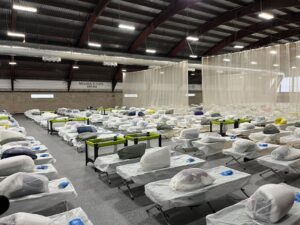
Beds for emergency family shelter set up in the Melnea A. Cass Recreational Complex in Roxbury on Wednesday, Jan. 31, 2024. Photo by Sam Drysdale | State House News Service
Families in the state’s emergency shelters could soon face time limits on how long they stay in shelters, and the head of the state’s immigration office says she’s confident that officials will find “viable options” for those who exhaust their stays.
Most of the new migrants in the state’s emergency family shelter system are “very talented individuals” who should be able to integrate into the Bay State once they gain basic English competency and work authorization, Office for Refugees and Immigrants Executive Director Cristina Aguilera Sandoval told legislators on Tuesday.
Appearing at a Joint Ways and Means Committee hearing about Gov. Maura Healey’s fiscal 2025 state budget, Aguilera Sandoval faced questions from Republican lawmakers about potential impacts from a proposed cap on how long families can stay in the emergency shelter system.
“What happens [after] nine months and one day with these individuals that are in the shelters?” asked Warren Rep. Todd Smola, the top-ranking House Republican on the panel. “I think that’s a big issue for everybody in the legislature. I understand the desire to change the policy, but it doesn’t seem to me that it’s been vetted by a lot of people.”
Aguilera Sandoval replied by describing “tools on the toolbelt” that her office, shelter providers and immigrant support groups try to bestow upon families staying in shelters, like basic English comprehension and permission to work in the United States.
“The majority of them are really very talented individuals that, with those tools in their toolbox, will be able to thrive,” she said. “On that nine month and one day, as you mentioned, the important part is: have we done our piece to make sure that they have what they need in their toolbox, that they have a roadmap to follow in terms of having access to housing or the programs that currently exist at [the Executive Office of Housing and Livable Communities], whether it’s HomeBase or others, and have they created that plan with their individual case manager to be able to stand on both of their feet?”
The House last week approved another $245 million injection of funding for the strained family shelter system that for the first time seeks to temporarily limit how long most people can stay at nine consecutive months, with longer stays available to pregnant women, veterans and people with disabilities.
Every House Republican voted against the bill. The House GOP pushed unsuccessfully through the spending bill – and in a previous shelter funding debate – to limit shelter eligibility only to people who have lived in Massachusetts for a certain period of time, which would block many newly arriving migrants from the system.
Top Democrats said the legislation gives the Healey administration options to create a “reapplication process” for families after a maximum stay, but the bill is otherwise mostly silent on the topic and the measure is intended to curb skyrocketing costs.
Rep. Mathew Muratore, a Plymouth Republican, honed in on a similar question as Smola during Tuesday’s hearing.
“You guys do a great job, no doubt about it. You’re doing yeoman’s work. But housing is out of all of our control, and we have a housing crisis,” Muratore said to OIR officials. “What happens on the nine months and one day if there’s no housing, if they’ve done everything they’re supposed to do but there’s no housing? That’s more the real issue that we’re all trying to figure out and grapple with.”
“It is definitely a concern,” Aguilera Sandoval replied. “But I’m confident that with working across government, with our HLC partners and with all the investments and support systems that have been created … [we] can really find viable options for families.”
The OIR chief added that creating more “out-of-the-box” options, like tapping into Massachusetts residents who have offered to host families for free or at low-cost rent, could help as well.
Demand for the emergency family shelter began to rise during Gov. Charlie Baker’s final months in office, then exploded to record levels in Healey’s first year. Healey last fall capped the number of families in the system at about 7,500, and her administration estimates it will need to spend more than $900 million per year – a more than fourfold increase over pre-crisis levels – on the services this year and next year.
Massachusetts is the only state in the nation that guarantees access to shelter by right for some eligible families and pregnant women.
About half of the families in the shelter system are migrants who recently arrived in the U.S., according to administration data.
Reflecting the sharp increase in migration, Aguilera Sandoval said OIR helped resettle about 11,500 individuals in fiscal 2023, more than five times the usual annual rate.
The “vast majority” of immigrants coming to Massachusetts are either seeking asylum, which involves proving a credible fear at the border to gain access to the United States, or are “paroled into the country” with permission, according to Aguilera Sandoval.
At Tuesday’s hearing, Democrat Rep. Vanna Howard of Lowell opened up about her experience as a refugee from Cambodia.
“I’m a refugee. I fled the killing fields of Cambodia, so I know what many of these folks that came through the border fleeing extreme violence with their children, with their families [experienced],” she said, her voice wavering as she described families “packing up with nothing on their backs.” “I know. My mom and I fled Cambodia to get to the border, to seek shelter. That’s what America does. They did it for me and my family.”




 |
| 

